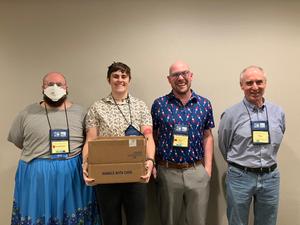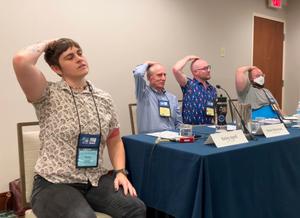Do you carry 50-lb. boxes up and down stairs on a regular basis? Climb up and down ladders? Decide you can totally drag that full bookcase across the floor? To the surprise of no one, you are not alone. Fred Rossero (Oblong Books, Rhinebeck, N.Y.), Kelsy April (sales rep, W.W. Norton), Josh Christie (Print: A Bookstore, Portland, Maine), and Peter Sherman (Wellesley Books, Wellesley, Mass.) have all been there. During their NEIBA panel, Bookseller Wellness 101 (or: Our Bodies Are Prisons of Flesh), they moved the discussion about the physicality and pain of working in bookstores past simple answers--stretch, hydrate--and instead had a conversation that was both broad and specific about bodies, store culture, and taking care of yourself.

|
|
|
Panelists (from l.) Fred Rossero, Kelsy April, Josh Christie, and Peter Sherman feel your pain. |
|
Rossero opened by reminding the audience that the panel did not include medical professionals--"we're just discussing based on our own experiences. There is no one-size fits all advice." The group started off with introductions to their work--and physical--experience. For Rossero, "It's been a process learning to enjoy my job without so much pain." Christie, who is a co-owner of Print, said that "even now, most of my job is frontline bookselling. One of the reasons I wanted to be on this panel is realizing the outcome of bookselling on my body after 20 years." Sherman has been a bookseller for "something like 45 years. I have been lifting and climbing and stretching for most of that time," he said. "I'm going to go out on a limb here and say I'm the oldest person on this panel and, as that person, I am recognizing my limits more than ever." April, who was a bookseller for 15 years and is now a sales rep for Norton, has worn "many hats as a bookseller: frontline receiving, manager, buying.... As a rep, I do a lot of sitting. And that difference in job has made a difference in how my body feels."
What, Rossero asked, "is something you've done that you look back on that makes you cringe?" Sherman once lifted a hand truck handle directly into his jaw--"it made me realize I'm really stupid." April said the "most regrettable thing I've ever done was pick up three fully loaded Penguin House #18s off the floor just to see if I could. You don't have to do that." Rossero refused help "carrying a very large air conditioner up the stairs" and dropped it on his toe. Christie, who admits his largest flaw in this arena is "thinking speed is the most laudable asset," was excited to show off the store's new ball caps for social media. "We went to a local playground to make some posts. I had not stretched and there were monkey bars, and I tore my left rotator cuff."
From there, the conversation was focused around two main themes: how to be good to your body and how to develop a store culture that allows others to be good to their bodies.
Being Good to Your Body
Rossero asked what things the panelists had done right for their body. "For me," he said, "the first thing was actually getting supportive shoes." Sherman agreed: "Shoes. Definitely. I'm not driven by fashion, but I realized it wasn't just my feet, my legs were hurting, too. I stumbled into a Dr. Scholl's device at a CVS store and never looked back. Now I own six pairs of the same shoes." For Christie and April, including more movement in their lives was an improvement. Christie said that a "lot of [being good to his body] was prioritizing activity and cardiovascular activity. Hiking and golfing during the summer and skiing during the winter." April said "the most valuable thing that I've learned is that bodies like consistency, and the body you have at home is the same body you have at work. Bodies are highly adaptable, so incorporating activity when I'm not at work is important. I focus mostly on core strength."
April discussed getting in tune with your own body: "Learning the difference between soreness and pain is key. Finding a regular exercise that I liked to do was huge in figuring that out." Christie agreed. "Being a skier, I think about good sore versus bad sore. If your job is making you sore, you can certainly work with your bosses to reduce that load; if your job is making you feel pain, that's not okay." April also mentioned focusing on that which we all know we should be doing--stretching and moving. But she expanded the concept, saying, "the best posture is the next posture--moving your posture throughout the day is what's good for you."
Creating a Culture
Have you ever found yourself setting a precedent you didn't realize you were setting, Rossero asked. Christie responded, "taking a holistic view of everyone's health has been really important to me, but also really difficult. I repeatedly tell my employees that they don't need to move as fast as me, there is no expectation. But I still move at that pace. So, I have to take better care of myself first." Sherman reminded the audience to do things with intention: "I try to pace things out so that no one person is rushing ahead with stacks of books. When I think about the stakes that are at play when someone is carrying things up or down the stairs, care is important. Speed is not the goal; getting things in the right place in the right way is the goal." April reminded people to ask for help: "Use tools if you have them. If you have a hand truck or a wagon, use it. Create a culture of 'we're all in this together.' At the end of the day, we're all humans in bodies, and we don't want to be hurting these bodies."
Rossero asked the panelists what they should do if their store culture is one in which a bookseller doesn't feel comfortable taking care of themselves. How should the person advocate for their needs? Sherman: "There are so many other aspects of preparing for things that don't necessarily require physical activity--find a way to play a role in the physically lighter tasks." Christie: "Specificity is what I would hope for the most. I would rather not assume malice in place of ignorance. If there are tasks that need to be done, explain why it is you are unable to do them so they can be adjusted." April: "Be honest with yourself and with your coworkers. Think about the workflow of your business and how you can create efficiencies to get things done around the store."
How about offsite events? It is often just one person doing the bulk of the work--how do you watch out for yourself and your staff? "The biggest thing we do is related to time," Christie said. "Give your employees enough time to do a reasonable number of things at a reasonable pace, have time to take a break before the event, and make sure they have the amount of time to do all of that in reverse." Sherman echoed Christie's points and said he does "preliminary run-throughs when doing events at new places." They also "repack boxes, breaking larger ones down into smaller boxes."  Rossero smiled and led the group in some of the more obvious things we can do to help ourselves but often ignore or forget. "Check the weather first" if doing something outdoors. "Drink water. Drink more water than you think you need to," Christie said. "Also eat food. Give your body the best chance it has to get through the event without injury."
Rossero smiled and led the group in some of the more obvious things we can do to help ourselves but often ignore or forget. "Check the weather first" if doing something outdoors. "Drink water. Drink more water than you think you need to," Christie said. "Also eat food. Give your body the best chance it has to get through the event without injury."
The panel closed with April demonstrating how to properly lift a box (use your core!) and leading the group through some seated stretching. A personal suggestion? Let's always end panels with stretching. --Siân Gaetano, children's and YA editor, Shelf Awareness

